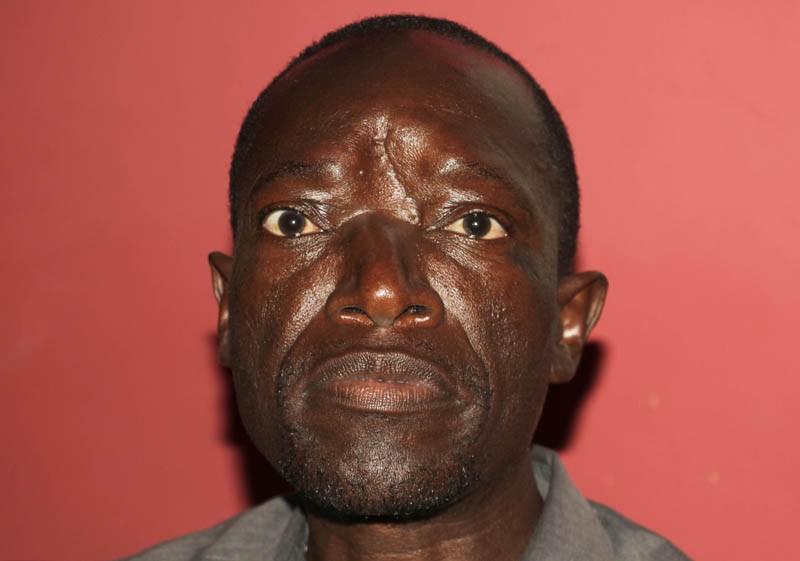Deformity at the hands of criminals
Ryder Gabathuse | Friday June 19, 2015 15:38


Three unknown men abruptly rained stones onto him. They hit him on the head and face. Then they beat him before leaving him for dead. Makhulu had just become a victim of a crime rampant in the streets of Francistown.
As if confused with his initial facts, he paused and gained composure before narrating the sordid details of the attack that left him scarred.
A month after the incident, a police statement by Sergeant L. Molefhe at Tatitown police station remains the only record, other than his face, that proves the attack was real.
Even the memory of how the three strangers emptied his pockets taking everything they could find is as painful as the attack itself.
It was in the summer of 2003. Gaothusi, a former employee of the Pep Stores knocked off duty as usual and decided to catch a taxi home.
He later disembarked at the Area-W shops to buy a few things before heading home to Riverside, a low-income location, just across the seasonal Tati River.
His wallet had over P900, which he intended to pay the rent and a few other debts with come August month end. He had on him a plastic bag containing foodstuffs for supper.
His house was not very far. He could still see the lights of his residence at 9pm when the three unsuspecting men threw stones at him.
“They started off by blocking my path and without uttering a single word they were all over me,” Gaothusi recalled like it happened yesterday. He never arrived home that night.
Tears welled up as he relived his nasty experience that his face scarred and almost deformed. The 49-year-old man, who hails from Tshesebe in the North East, said that not only was he left scarred on the face, but also his eyesight was badly affected. Worse, his disfigured face has a badly depressed skull, with eyes slightly protruding from the sockets.
He however, gathers solace from the fact that he was not born with the ‘ugliness’ inflicted by criminals. The fact that he is still alive is victory against their cruelty.
“The medical doctors at the Nyangabgwe Referral Hospital (NRH) where I was attended, feared that I may not be able to see and speak normally again given the injuries that I sustained,” he said, indicating that he was given six months sick leave from work.
The medics also feared that he might permanently be a mental case after he was bedridden at the NRH for four full days and could not speak during those days.
He said: “As my sight was not perfect after the attack, I could see double objects and I feared it was going to be permanent”.
Before the injuries he was a sales assistant and believes that were it not for the incident he would have progressed through the ranks.
His plan was to retire after age 65, but that has changed since last year he was forced to take early retirement. He was no longer coping with the demands of the job.
“As for me I have accepted my fate and allowed life to go on. But, those who grew up with me cannot easily believe it’s me because I am deformed now,” he said.
His doctors had suggested at some stage that he see a specialist in South Africa to do corrective surgery at a cost of about P20,000 with an option for government to pay half and him the balance. “But, I was told the process was risky as I was likely to lose my life. My family had accepted me as I am and life goes on. Even my fiancée and my children have no problems with who I am,” he said.
He concurs that he is completely a new person altogether and has stopped visiting some of the recreational places he used to frequent.
“The only thing that I can do today is light duty, as my condition prohibits me from performing any hard labour that men of my age can do,” he said. He is still painfully worried that the men caused his deformity are still at large and remain completely unknown. He worried that he could be mingling with them without even knowing it.
“Crime is a reality and not a joke in Botswana,” he said. Tatitown station commander Superintendent Cyprian Magalela said although he could not recall off the cuff cases reported 12 years ago, the procedure is that dockets of criminal cases of this nature remain active for a period of 20 years before they are closed for any reason.
He warned that it was indeed dangerous to cross at areas like the motor bridge where Gaothusi was attacked at night, especially when it is dark. “We always advice people that when they travel at night they should avoid dark alleys as the strength of criminals is darkness. People should travel where there is light as that could frustrate criminals,” Magalela said.
